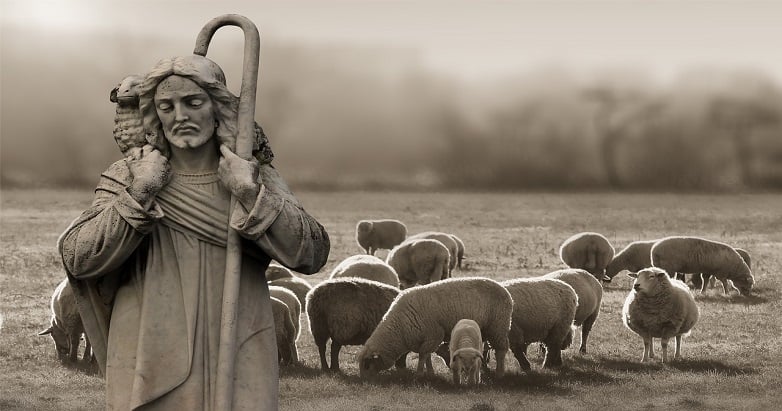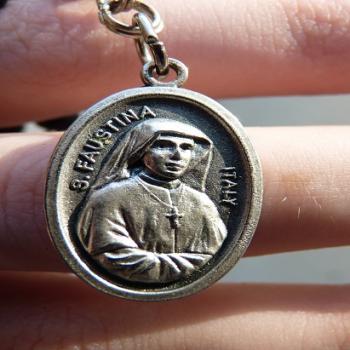Researching the topic of Hell continues to be an uncomfortable Christian topic for me, even after doing research articles about it. I don’t believe for a second that God feels “indifferent” about souls who refuse salvation. A few nights ago, I had a dream where Jesus showed me firsthand how heartbroken He is over watching people spit on His mercy, even knowing the consequences in full.
Thank you to geralt on Pixabay for this fantastic feature image!

Dream Analysis
In this dream, I came face to face with an apparent serial killer. This man was ruthless and had no intention of ending his spree of harming innocent people.
At some point, I either called out for Jesus, or He showed up of his own accord. We cornered the serial killer in a small Catholic church where Jesus telepathically bound him, forcing him to lie down on a stone rectangular pedestal.
Jesus directly warned this man that if he refused to stop, he would face the consequences. That is to say, he would condemn himself to Hell.
In response, the man brazenly snapped back at Jesus, something along the lines of refusing to stop. Not even God Himself warning this man was enough to sway him.
Somehow, the stone slab tipped downward, and the man slid down out of sight. While I didn’t see anything else of him, I presumed that he’d been sent to Hell because of his refusal to cease his mercilessness.
Afterward, Jesus and I didn’t speak much of it. But what I remember the most about this dream was how heartbroken and exhausted He looked at the end. There was no relief, no anger, just weariness.
It was clear to me that Jesus received no joy or satisfaction from having to punish this man.
God Hates Spiritual Death
I’ve found three different verses in the book of Ezekiel where God says that He gains no pleasure from the death of the wicked. This one in Ezekiel 18:32 has always stood out to me in this regard:
“For I take no pleasure in the death of anyone, declares the Sovereign LORD. Repent and live!” (Ezekiel 18:32)
Here are two others:
“Do I take any pleasure in the death of the wicked? declares the Sovereign LORD. Rather, am I not pleased when they turn from their ways and live?” (Ezekiel 18:23)
“Say to them, ‘As surely as I live, declares the Sovereign LORD, I take no pleasure in the death of the wicked, but rather that they turn from their ways and live. Turn! Turn from your evil ways! Why will you die, people of Israel?’” (Ezekiel 33:11)
Analyzing this dream of mine gave me a different, possibly inverted takeaway from the Parable of the Lost Sheep. I know that the classic meaning of that parable is that all Heaven rejoices when just one soul is saved.
Now, after seeing how devastated Jesus was by the loss of this man, even though we’d both heard him refuse to stop hurting people, I can see that even the loss of one soul crushes God’s heart.
Commentary From Medjugorje
When I first read the testimonies of the children in Medjugorje, Croatia, who were given visions of the afterlife by Mary, I remember reading the comments of Jakov, one of those kids, about Hell.
I found recorded quotes from an interview given to him and a few of the other visionaries about what they saw in Hell. When the interviewer asked Jakov if he feels anguish after seeing the suffering in Hell, he affirmed it.
In his words, nobody has to go to Hell. It’s the ultimate waste of a life, a self-chosen fate that nobody has to choose for themselves.
Frollo’s Fall
Much of the dream I had reminded me of Frollo’s fate, the villain from Disney’s The Hunchback of Notre Dame. Both Frollo, the oh-so-holy religious man, and this dream serial killer showed no mercy towards their victims. When given the chance to obtain mercy for themselves, they willfully spat on it for the opportunity to continue harming others.
By choosing mercilessness even after receiving mercy, they brought about God’s justice upon themselves.
There was a Bible verse in the back of my mind that stood out to me after rewatching this scene as an adult. I found it in James:
“For judgment is without mercy to one who has shown no mercy. Mercy triumphs over judgment.” (James 2:13)
What freaks me out about this scene is that Frollo silently pleaded for Quasimodo to spare him. Quasimodo showed an absolute heart of gold and couldn’t bring himself to let Frollo die, even after the wretch had cruelly confessed to murdering his mother 20 years prior.
Frollo then seized his opportunity to kill both Esmerelda and Quasimodo in one fell swoop instead of doing the right thing by finally letting them go. From what I’ve gleaned after rewatching this scene over and over again across recent years, Frollo’s unending malice and brazenly declaring himself as God (in the sense that he somehow had the authority to decide that they deserved death) was the last straw.
Gandalf’s Wise Words About Pity
I’ve recently rewatched The Fellowship of the Ring, and I loved watching this quiet moment between Gandalf and Frodo while in the Mines of Moria:
In this scene, Gandalf and Frodo discuss the unnerving reality that Gollum, a former Hobbit driven mad after 500 years of possessing the One Ring, has been endlessly pursuing them on their Quest. Frodo contemptuously says that Bilbo should’ve killed Gollum during their encounter in The Hobbit:
Frodo: “It’s a pity Bilbo didn’t kill him when he had the chance.”
Gandalf: “Pity? It was pity that stayed Bilbo’s hand.”
“Many that live deserve death, and some that die deserve life. Can you give it to them, Frodo?
Do not be too eager to deal out death and judgment. Even the very wise cannot see all ends.”
–Frodo and Gandalf, “The Fellowship of the Ring”
Much of this conversation brings to mind Jesus’ words in Matthew 7, especially Matthew 7:1-2:
“Do not judge, or you too will be judged. For in the same way you judge others, you will be judged, and with the measure you use, it will be measured to you.” (Matthew 7:1-2)
It’s dangerous for us to declare, based on our own standards, who deserves to die. Frollo provides a stark example of this hypocrisy, which ultimately led to his own death. He refused to accept responsibility for his own sins and wrongdoings, instead choosing to project them onto his victims, as seen in his song “Hellfire”:
God Loves Mercy
God prioritizes mercy and, for good reason, expects us to do the same for others. This article by Life Hope & Truth does a great job explaining what mercy entails, by using analogies and these Bible verses:
“He has shown you, O mortal, what is good. And what does the LORD require of you? To act justly and to love mercy and to walk humbly with your God.” (Micah 6:8)
“Blessed are the merciful, for they will be shown mercy.” (Matthew 5:7)
“Be merciful, just as your Father is merciful.” (Luke 6:36)
In summary, we should always avoid following the example of the merciless servant discussed in Jesus’ parable in Matthew 18:21-25.
Spiritual Linguistics
God is mercy and compassion incarnate. Choosing actions contrary to His nature, like Frollo’s example, have the consequence of causing distance between Him and us.
I was scrolling around on YouTube and found this video by BibleProject exploring how compassion is a core part of God’s nature:
This video shares these Hebrew words:
Rakhum: compassionate, and Rakhamim: compassion. BibleProject explains here that these two words deliberately invoke the compassion and love a mother feels for her child.
I found out today that, in Arabic, Rahma means “mercy”. It’s interesting to me how this word compares linguistically to these above Hebrew words. While they’re not entirely identical, I love the etymological similarities.
Discovering the similarities between the Abrahamic faiths is honestly uplifting to me. It looks like we all have related ways of defining God as merciful and compassionate.
When I first joined Patheos, I learned that one of God’s titles in Islam is Ar-Raheem. My fellow Patheos writer Ejaz Naqvi, MD, wrote this brilliant article about how God’s infinite mercy is detailed in the Qu’ran.
I also came across this brief educational video on YouTube by TRS Academy explaining how God’s mercy is given, even to those who one might say don’t deserve it:
Cross-References of Mercy Between the Qu’ran and the Bible
One of the most beautiful verses about God’s mercy in the Qu’ran is verse 39:53, urging us not to give into despair and think that we’re somehow irredeemable. This verse calls the reader to remember that God is the Forgiving and the Merciful, that He forgives all our sins.
This verse from the Qu’ran flows beautifully with 1 John 4:18:
“There is no fear in love, but perfect love casts out fear. For fear has to do with punishment, and whoever fears has not been perfected in love.” (1 John 4:18)
Trusting in God means letting go of our fear that no matter what we do, we’re somehow unforgivable for past sins we’ve committed. We should never let that fear, that lie, cripple us and prevent us from approaching God.
It’s poisonous for any of us to declare otherwise.
Choose Mercy
My mind’s still stuck on that dream serial killer. Honestly, it was disturbing to hear him scorn Jesus’ warning that refusing to stop committing his sins of murder would lead to eternal consequences. Jesus gave this guy, a merciless criminal, the chance to receive mercy, but he spat on it.
God can’t force us to let go of our sins and choose His mercy instead. His mercy is abundant and everlasting, available for all to seek. God can’t force us to accept His mercy, something I saw firsthand in that dream.
I wish that dream had gone differently, that this man had chosen to listen to Jesus and had heeded His words. What if that wasn’t just a dream, but a rehashing of a true encounter between Jesus and a merciless soul? The thought chills me.
To wrap this up, in contrast to how that dream played out, here’s a chain of heartwarming scenes of Valjean’s journey from the 2012 adaptation of Les Misérables:
The Bishop’s unexpected mercy causes Valjean to transform, making a tearful 180:
I love that this same Bishop gave Valjean his final farewell before the former convict ascended to Heaven after dying:
So thankful to hear these powerful words once again, which sing true to God’s nature:
“And remember, the truth that once was spoken:
to love another person is to see the face of God.”
–“Les Misérables”
Featured Image by geralt/Pixabay
Hello, and thank you for supporting my work here on Patheos! If you’d like to support me further, please feel free to “Buy Me A Coffee” here:












